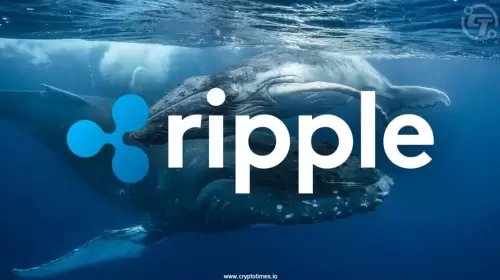 |
|
 |
|
 |
|
 |
|
 |
|
 |
|
 |
|
 |
|
 |
|
 |
|
 |
|
 |
|
 |
|
 |
|
 |
|
Nachrichtenartikel zu Kryptowährungen
GENIUS Act hits new resistance as Democrats target Trump family profits and UAE cash. What really happened?
May 05, 2025 at 08:42 pm

Just days before a crucial Senate vote on the GENIUS Act, a bipartisan bill that would set the stage for a U.S. framework for stablecoins, nine Democratic senators announced their opposition to the legislation unless additional anti-money laundering and national security measures were included.
The senators, who include some of the key backers of the bill in the lower chamber, stated their intent to vote against the legislation if these measures were not integrated.
"We urge the Senate to reject the bill in its current form and instead pass legislation that provides comprehensive consumer and financial stability protections, enforces robust anti-money laundering and national security measures, and holds bad actors accountable," the senators wrote in a statement.
The bipartisan legislation, which stands for Guiding and Establishing National Innovation for U.S. Stablecoins Act, passed the Senate Banking Committee in March with bipartisan support. However, it faces a higher threshold to clear the full Senate, requiring 60 votes to overcome a filibuster.
Majority Leader John Thune had scheduled a vote for the bill by Memorial Day. But with five Democrats and 13 Republicans needed for a majority and several key senators signaling their opposition, the bill's passage before the holiday appears increasingly uncertain.
The bill, which would define who can issue dollar-backed stablecoins and under what conditions, is intended to bring legal clarity to a market that now accounts for more than $240 billion in market value. Tokens like Tether (USDT) and USD Coin (USDC) facilitate most crypto transactions and are used by millions of consumers daily for payments and money transfers.
The legislation permits bank-affiliated subsidiaries and federally approved nonbank entities to become "permitted payment stablecoin issuers." These issuers must maintain one-to-one reserves using high-quality liquid assets such as cash or U.S. Treasuries, and all funds must be kept in segregated accounts to protect customer holdings from institutional risk.
To ensure transparency, issuers will be subject to monthly reserve audits conducted by independent registered firms. Senior executives, including the chief executive and chief financial officer, must personally certify the accuracy of these reports.
Smaller issuers can choose to remain under state regulatory systems, provided they meet the federal baseline. Those managing more than $10 billion in stablecoins will be jointly supervised by the Federal Reserve and the Office of the Comptroller of the Currency.
For issuers with more than $50 billion in stablecoins in circulation, the law requires annual financial audits, with specific scrutiny on any transactions involving related parties. Firms that fail to comply with these requirements face a daily penalty of $100,000.
In addition to financial safeguards, the bill applies the anti-money laundering provisions of the Bank Secrecy Act. It also mandates transparent and enforceable redemption policies, ensuring users can reliably exchange stablecoins for U.S. dollars.
Importantly, the legislation excludes algorithmic stablecoins, such as those that attempt to maintain a dollar peg using an autonomous money supply, from its framework. The bill calls for the Treasury Department to conduct a separate study on how to handle such models in the future.
Furthermore, issuers covered under the GENIUS Act will not have access to Federal Reserve master accounts, limiting their ability to integrate directly with the banking system. This restriction could shape how these firms operate within U.S. financial infrastructure.
Proponents of the bill argue that it will reinforce the role of the U.S. dollar in digital finance and increase demand for government debt through mandated reserve holdings.
However, critics have raised structural concerns about the bill, such as the potential for a loophole that might give foreign issuers, like Tether, an edge over domestic firms, and the lack of restrictions on large companies.
For instance, entities like Amazon could theoretically issue their own stablecoins under this framework, an outcome that some lawmakers see as risky.
"The GENIUS Act is a bipartisan bill that provides a common-sense framework for stablecoins in the United States," said Senator Bill Hagerty (R-TN), who introduced the bill. "This legislation will promote innovation and competition in the digital asset ecosystem while safeguarding consumers and the financial system."
Senator Kirsten Gillibrand (D-NY), one of the bill's original co-sponsors, added, "This bill will create a level playing field for American innovators and ensure that consumers are protected from fraud and abuse."
The bill's opponents argued that it failed to adequately address critical issues such as money laundering, national security, and consumer protection. They also expressed concern about the potential for the bill to be used to enrich political insiders.
"This bill is a recipe for disaster," said Senator Elizabeth Warren (D-MA). "It would allow the Trump family to get even richer by laundering money through a stablecoin and it would open the door to widespread fraud and abuse."
The bill's supporters countered that the Democrats' opposition was surprising given the broad bipartisan support the bill had already garnered.
"It's
Haftungsausschluss:info@kdj.com
Die bereitgestellten Informationen stellen keine Handelsberatung dar. kdj.com übernimmt keine Verantwortung für Investitionen, die auf der Grundlage der in diesem Artikel bereitgestellten Informationen getätigt werden. Kryptowährungen sind sehr volatil und es wird dringend empfohlen, nach gründlicher Recherche mit Vorsicht zu investieren!
Wenn Sie glauben, dass der auf dieser Website verwendete Inhalt Ihr Urheberrecht verletzt, kontaktieren Sie uns bitte umgehend (info@kdj.com) und wir werden ihn umgehend löschen.
-

-

- LayerZeros ZRO -Preis unter Druck: Token -Entsperren droht groß
- Jun 20, 2025 at 12:25 pm
- Das Zro von LayerZero steht am 20. Juni vor einem großen Token -Freischalt, was sich auf den Preis inmitten bärischer Trends auswirkt. Wird die Abstimmung zum Verbrennen von Token die Angebotserhöhung ausgleichen?
-

-

-

-

-

-

-

- Quantum Computing, Bitcoin und kryptografische Bedrohungen: Eine New Yorker Minute zur drohenden Krise
- Jun 20, 2025 at 12:31 pm
- Der schnelle Fortschritt von Quantum Computing stellt eine erhebliche Bedrohung für die kryptografische Sicherheit von Bitcoin dar. Erfahren Sie mehr über die Risiken, potenzielle Lösungen und was es für die Zukunft bedeutet.




























































